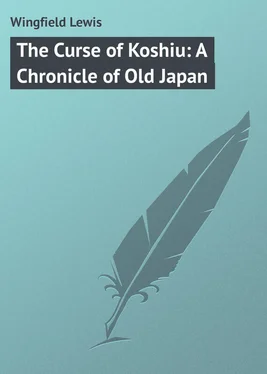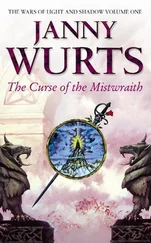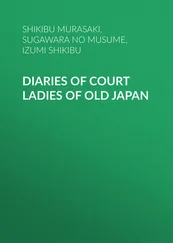Lewis Wingfield - The Curse of Koshiu - A Chronicle of Old Japan
Здесь есть возможность читать онлайн «Lewis Wingfield - The Curse of Koshiu - A Chronicle of Old Japan» — ознакомительный отрывок электронной книги совершенно бесплатно, а после прочтения отрывка купить полную версию. В некоторых случаях можно слушать аудио, скачать через торрент в формате fb2 и присутствует краткое содержание. Жанр: foreign_prose, на английском языке. Описание произведения, (предисловие) а так же отзывы посетителей доступны на портале библиотеки ЛибКат.
- Название:The Curse of Koshiu: A Chronicle of Old Japan
- Автор:
- Жанр:
- Год:неизвестен
- ISBN:нет данных
- Рейтинг книги:3 / 5. Голосов: 1
-
Избранное:Добавить в избранное
- Отзывы:
-
Ваша оценка:
- 60
- 1
- 2
- 3
- 4
- 5
The Curse of Koshiu: A Chronicle of Old Japan: краткое содержание, описание и аннотация
Предлагаем к чтению аннотацию, описание, краткое содержание или предисловие (зависит от того, что написал сам автор книги «The Curse of Koshiu: A Chronicle of Old Japan»). Если вы не нашли необходимую информацию о книге — напишите в комментариях, мы постараемся отыскать её.
The Curse of Koshiu: A Chronicle of Old Japan — читать онлайн ознакомительный отрывок
Ниже представлен текст книги, разбитый по страницам. Система сохранения места последней прочитанной страницы, позволяет с удобством читать онлайн бесплатно книгу «The Curse of Koshiu: A Chronicle of Old Japan», без необходимости каждый раз заново искать на чём Вы остановились. Поставьте закладку, и сможете в любой момент перейти на страницу, на которой закончили чтение.
Интервал:
Закладка:
Treachery stalks through the history of Japan. At any instant the dominant Hojo might be murdered under his son's eyes. Would the self-indulgent No-Kami be prepared with vigorous promptitude to avenge the slain, and, seizing the dropped reins, pursue his policy? Both father and mother sadly shook their heads. Even their partial vision could not but perceive that the hope of the house was a leper, abnormally sinful, inclined to become a sybarite. Was this young man to be left to steer the bark without a pilot? Certainly not. In case of anything unexpected arising, a staff must be prepared for him to lean upon. A man must be placed by his side, old in years and in experience, whose position and wisdom would command respect, whose interest it would be to bestow sound advice and timely sage reproof.
What better guide than a prudent father-in-law? What surer loadstone to lure an embryo debauchee from the muddy byways of low company than a beautiful patrician bride? one of the pure and slender, refined and high-bred maidens of noble lineage-fair and sweet as the fragrant mountain-lily-who now, as five hundred years ago, are the brightest glory of Japan.
A crafty combination this on the part of the warrior-statesman, which would doubtless have been crowned with success, if he had not chanced to live in a world where mischievous spirits delight in frustrating plans the most cleverly matured. Tomoyé heard, and listened dubiously. Even among the most elevated Japanese, as well as in the highest European circles, papas and mammas will differ as to the ideal bride. What was the precise article that would suit No-Kami? Unfortunately there was not time to have one specially ordered. Since perfection is chary of repetition, it was not to be expected that another Tomoyé-a stern yet loving lioness-could be found for the precious youth. Indeed, so recreant a scion was he of the stock, that he might have objected possibly to a muscular and fiery wife whose pastime was the chopping of heads. And yet not so. A true lion-whelp was he in blood enjoyment. Even the low-born Geisha singing girls who stocked his harem, had often cried under his buffets, and shouted shame, with tears, at his barbarous treatment of his servants.
Alas! how sad it is that even the most sapient in mundane experience will be guilty of errors sometimes that are patent to the lesser fry. Is it over-anxiety that blinds them? The problem was to put the finger on a great noble-daimio among daimios-who could compare in descent and grandeur almost with the line of Hojo; who, of weight in counsel, and rather cool than hot, would stem precipitate rashness. He must have no son, and but one daughter, and devoid therefore of the ambition which accompanies male issue, must adopt his daughter's husband as his son; and by thus uniting the two families in closest bonds, make their interests identical. The child of the magnate (given that the two were found) must be mentally perfect, and a vision of corporeal loveliness.
"My dear!" quoth the broad-shouldered but practical Tomoyé, as with one eye critically closed she assayed the temper of a brand new sword. The lady was apt to get vexed when her lord grew warm and garrulous. "My dear," she observed, "we have many rounds of mortal life to climb ere, reaching the summit, we attain Nirvana. Though you are good enough to be blind to my blemishes, even I am not quite perfect. Perfection, in our present low cycle, is so very scarce, you know." With this she beamed upon her lord, whilst artlessly belying her words by approvingly fingering her muscles. She was inwardly aware, with pardonable pride, that no other daimio's daughter could boast such an arm as hers.
My lord was provoked, and rubbed his nose. When you are erecting airy towers, practical people are exasperating. It was evident she had gained a point, so she proceeded to follow it up.
"Where in broad Japan do you propose to seek these paragons? This pink of perfect daimios, and his yet more model child?"
There was a tendency to irreverence in this tone, which required nipping in the bud. The eye of the Mikado's master shot forth a gleam, before which even the lioness cowered. When his mind was made up, the Hojo brooked no argument.
"Be it as you will!" Tomoyé dutifully murmured. "My lord is all-wise, all-powerful; his wife his willing slave. Go forth and seek the paragons, and let us hope you will find them soon."
To please him whom she loved best on earth, Tomoyé made believe to be convinced; and yet her woman's tact whispered down in the deep recesses of her manly bosom, that my lord, for all his wiliness, was wrong; that he was building a fool's paradise far up in Œther, out of which her dear boy might tumble.
Curious to relate, the paragons concerning whom she was tempted to be disrespectful were not far to seek. With but little hocus-pocus father and daughter were conjured on the scene, as absolutely the "very thing," to all appearance, as the cunning Hojo had conceived them. He declared as much at least, and dutiful Tomoyé acquiesced, slightly pinching her lips in silent protest. Instead of the "very thing" which was to bring about complete success before its time in our weary pilgrimage of cycles, the mother's instinct beheld with prophetic vision, in the proposed alliance, the worst elements of discord and defeat, – of so dire and dread a tragedy as should shake Japan to its centre, and annihilate the dominating house. Yet who was she, the warrior wife reflected in her humility, to set up puny instincts against the ripened statecraft of my lord? Her muscles were better than her brains. Should she presume to know more than he who held in his hand Mikado, nobles, people? – whose nod was law in the land beloved of Buddha? who had preserved it from contamination from without? Her place was to bend before the will of the dictator, and offer prayers for her husband and her son.
The most perfectly poetic spot in all poetic Japan, whose ensanguined history is made beauteous to the eye of a fastidious posterity by the flora of chivalry and valour, is Nara.
Lovely and secluded, sweet-smelling and umbrageous Nara! The Nara of to-day-how much more the Nara of five hundred years ago-suggests to the incursive foreigner a bit of Eden's garden.
In very early times the central mart of Japanese opulence (which ebbed by-and-by to Kiŷoto), it came after a while to be recognised as the special home of holiness. Accepting the better part, it exchanged the shimmering sham glory of mundane ambition for the sheen reflected from above. Some twenty miles from Kiŷoto-time-honoured residence of Mikados, and therefore a sacred city-the small town of Nara stands on a plain surrounded by rugged hills. Passing through low grey streets, leaving on the left a huge and ornate pagoda, you enter a tangle of wild greenery-an ideal wood of immense cryptomerias darkling skyward after light. A jungle of variegated foliage, so sweet and fresh, masks half their altitude, while the undulating ground beneath is broken into verdant waves chequered with blossoms of all hues. This forest is vast and silent, save where a white-robed group of pilgrims saunters along its glades-undefended by barriers, save those of religious custom. And what more tough than they? If sprightly and given to skull-cracking, the Japanese live in terror of their deities, who without exception are vindictive. Buddha and the lesser lights are awful and threatening and ever-present, and the favourite hunting-grounds of Buddha are the hallowed groves of Nara.
The thickets teem with game. All kinds of coy animals which usually flee at sight of man, here hold undisputed sway. The intruder is on their territory, and they let him know it. The timorous doe stands with soft unstartled eyes across the path, sniffing with moist nostrils the expected cake. And if the white-clad pilgrim should have striven to combine economy with cure of soul by investing in cheap offerings, the scornful stag and his following will shake their ears, and bound away to relate to the gods the insult. With head on one side, birds look critically down from boughs, nor think of flight; hares, taught by impunity, instead of making off, white scut in air, groom nose with paw, undaunted.
Читать дальшеИнтервал:
Закладка:
Похожие книги на «The Curse of Koshiu: A Chronicle of Old Japan»
Представляем Вашему вниманию похожие книги на «The Curse of Koshiu: A Chronicle of Old Japan» списком для выбора. Мы отобрали схожую по названию и смыслу литературу в надежде предоставить читателям больше вариантов отыскать новые, интересные, ещё непрочитанные произведения.
Обсуждение, отзывы о книге «The Curse of Koshiu: A Chronicle of Old Japan» и просто собственные мнения читателей. Оставьте ваши комментарии, напишите, что Вы думаете о произведении, его смысле или главных героях. Укажите что конкретно понравилось, а что нет, и почему Вы так считаете.












